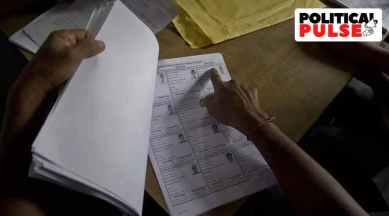Should Dalit Christians, Muslims get quota benefits? RSS body to discuss issue
The Sangh Parivar has been traditionally opposed to granting reservation benefits to converted Dalits. It has also supported demands to deny quota to converted Adivasis as well.

Even as the K G Balakrishnan Committee examines the issue of quotas for Dalit Muslims and Christians, the Rashtriya Swayamsevak Sangh’s (RSS) mass communication wing Vishwa Samvad Kendra is set to organise a two-day conference in Noida to discuss whether people from Scheduled Caste (SC) groups who have converted to Islam and Christianity should get reservation benefits or not.
The conference, beginning March 4, is being organised in collaboration with Gautam Buddha University, Greater Noida. Sources said the event would see participation from jurists, educationists, research students, voluntary organizations and even some former diplomats.
The event coordinator, Pravesh Chowdhary, said on Tuesday, “After the constitution of the Sachar Committee, the Ranganath Misra Commission and its recommendation, a situation has arisen among the Scheduled Caste brothers in the country regarding whether the converted Christians and Muslims should get reservation or not. There is also an ongoing discussion on this in society. Some people believe that converted Christians and Muslims do not find any change in their social status even after converting from Hinduism … On the other hand, the majority society of the country believes that the Scheduled Castes whose religion is Hinduism, should get all the facilities, representation and reservations provided by the Constitution.”
Chowdhary, who is an assistant professor at the Centre for Comparative Politics & Political Theory, Jawaharlal Nehru University, said it was important to have a discussion while the Balakrishnan committee — K G Balakrishnan is a former Chief Justice of India — examines the issue. He also said whatever comes out of these discussions would be presented to the government.
“Many questions have been raised in society regarding the recommendations of the Ranganath Misra Commission, its validity, study, method of analysis, and time period. This discussion is being organised only to give an independent platform to the intellectual class of society. The speciality of this discussion is that professors, deans of schools, heads of departments, vice-chancellors, research scholars and representatives of non-governmental organizations are also participating in this discussion. Many former judges and senior advocates are also participating in this,” Chowdhary said.
The Vishwa Hindu Parishad’s (VHP) Vijay Shankar Tiwari who briefed the media along with Chowdhary on the issue, however, said the VHP’s earlier stated position was that SCs who converted to Christianity and Islam should not get reservation benefits. Chowdhary said he was in favour of granting reservation to those who do “ghar wapasi (convert back to Hinduism)”.
Chowdhary said that while preparing for the conference, the organisers had invited research work on the subject from across India and as many as 150 papers were received. He said 70 of these papers were shortlisted for the conference and there would be 32 speakers who will hold forth on 14 subtopics related to reservations.
The Sangh Parivar has been traditionally opposed to granting reservation to converted Dalits. The Sangh — through public movements and submissions of some BJP MPs in Parliament — has also supported demands to deny reservation to converted Adivasis as well.
Back in 1961, the Akhil Bharatiya Pratinidhi Sabha (ABPS), the highest decision-making body of the RSS, said, “If any scheme of separate reservation … of different sects is sought to be envisaged for political purposes, it will prove highly detrimental to national unity…”
In 1990, in response to Christian demands for reservation on the lines of neo-Buddhists, the ABPS said that “the Constitution makers envisaged these concessions only to remove caste-based discrimination and inequality prevalent in Hindu society …”
Even the BJP has made similar noises in the past. In February 2010, the BJP national executive passed a resolution criticising the Misra Commission. It said, “(The) commission cannot dictate or thrust its opinion on the Christian Pope or Muslim maulvis … reservation would amount to a formal introduction of a caste system in Islam and Christianity, thus changing the basic tenets of these religions, which is outside the jurisdiction of both Parliament and the judiciary and also contrary to the provisions of the Koran and the Bible.”
The Central government last October notified a Commission under Balakrishnan “to examine the matter of according Scheduled Caste status to new persons, who claim to historically have belonged to the Scheduled Castes, but have converted to religions other than those mentioned in the Presidential Orders issued from time to time under Article 341 of the Constitution”.
The Commission will submit its report within two years.
As of now, reservation benefits are available only to Dalit Hindus, Buddhists, and Sikhs. Several petitions are pending before the Supreme Court seeking reservation benefits for Dalits who converted to Christianity or Islam.
The Ranganath Misra and Sachchar Commission reports, submitted during the rule of the Congress-led United Progressive Alliance (UPA), have both been in favour of state instruments for greater representation of Muslim Dalits. The Sachar Commission report observed that the social and economic situation of Dalit Muslims and Dalit Christians did not improve after conversion. The Misra Commission, which submitted its report in May 2007, recommended that SC status should be “completely de-linked…from religion and…Scheduled Castes (should be made) fully religion-neutral like…Scheduled Tribes”.